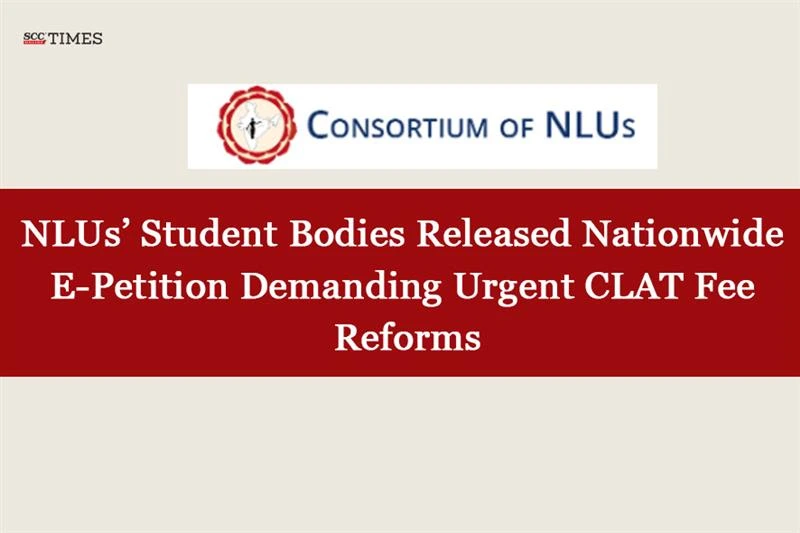Student Bar Associations and Marginalised Communities Empowerment Clinics from National Law Universities (NLUs) across India have stepped up their call for urgent reforms to the CLAT application and counselling fees. They have recently launched a public e-petition to rally widespread support against the very high fees currently charged by the Consortium of National Law Universities.
This recent thrust for reform comes from a formal representation made in 2024 by student bar associations and marginalised communities empowerment clinics, including the Savitribai Intersectional Study Circle at NALSAR (SISC), NALSAR Student Bar Council, NLS Savitri Phule Ambedkar Caravan (SPAC), NLS Student Bar Association, DSNLU Student Council, DNLU Student Bar Association, and NLIU Bhopal Savitri Phule Ambedkar Caravan (SPAC).
That representation put the spotlight on the unjust and discriminatory character of the ₹20,000 non-refundable seat confirmation fee and other exorbitant counselling fees, contending they raise insurmountable economic barriers for students, especially those belonging to economically weaker and marginalized categories. In spite of this filing, the Consortium made no response or effective action. The lack of a response has motivated the students to expand their efforts this year by involving alumni, faculty, parents, and legal professionals to join together for change.
The new demands made by students in the e-petition pertain to two serious problems in the CLAT admission process: non-refundable counselling and confirmation fees, and extremely high application fees. The current counselling process charges students ₹30,000 (₹20,000 for reserved categories) as a first instalment to attend. But if a candidate is then later allotted a seat, they are required to pay a further, entirely non-refundable ₹20,000 confirmation fee. Not paying the fee in a rush result in the automatic loss of the seat, even if the first counselling fee was paid. Moreover, candidates who are not allotted a seat in an early round and wish to attend later rounds are required to pay this non-refundable confirmation fee anyway. If they are not allotted too, this massive sum is simply not refunded, unfairly loading students with a financial burden. The CLAT application fee itself is ₹4,000 for General candidates and ₹3,500 for reserved categories. This massive application fee is particularly controversial given that a recent Ministry of Human Resource Development (MHRD) report presented to the Supreme Court had criticized the CLAT Committee for its excessive fees, stating that an application fee of no more than ₹1,500 would suffice for the national-level law entrance test. The MHRD report had discovered it “egregious” that NLUs were making profits of up to 90% on application forms. These extremely high non-refundable fees have the effect of a strong deterrent to economically weaker students, many of whom come from families with incomes of less than ₹10,000 per month.
The petition highlights a concerning disparity between CLAT’s fee policy and the fee policies of other national entrance examinations. JEE Main and NEET, for instance, have significantly lower application fees (around ₹1,000 and ₹1,700 for general categories, respectively). Their counselling processes are also more student-friendly: JoSAA (for IITs and NITs) and NEET counselling both employ refundable acceptance of seats or security deposits that are deducted against admission fees, with no upfront loss to the candidates for eg. in JoSAA there’s no such thing called as counselling fee the JoSAA only take one fee ie ‘Seat Acceptance Fee’ which is ₹34,000 for general category students and ₹17,500 for reserved category nearly half of CLAT counselling combined fee. CLAT’s non-refundable confirmation charge, coupled with stratospheric application fees and rigid payment schedules, adds up to a uniquely exclusionary system with no official system of fee waivers or financial aid.
In light of these systemic problems and silence of the Consortium, the student organizations have launched a Nation-wide e-petition to mobilize wide-based support. They call for comprehensive reforms to align the CLAT fee structure with national standards like JEE, NEET, and CUET, ensuring greater affordability and accessibility for all candidates, especially those from economically weaker sections. The petition cautions against uncontrolled commercialization of legal education, contending that education should be preserved as a fundamental right, not a privilege for those capable of paying huge upfront fees. You may view and sign the e-petition here: https://forms.gle/tzZTbMbuvQyKgMEo7
This joint effort of NLU student bodies is a significant effort at democratizing access to legal education in India. By attempting to eliminate the economic barrier in the CLAT admission process, they are seeking to ensure that no meritorious student is denied the opportunity to study law due to his or her economic background. The spotlight now rests on the Consortium of NLUs to heed these appeals and bring serious, equitable changes.


